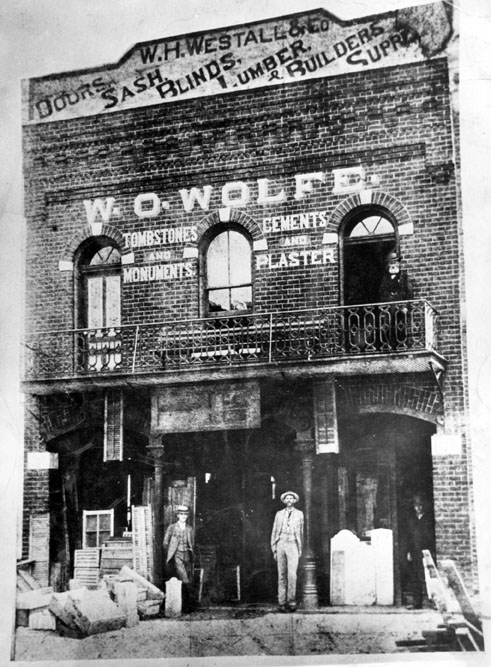William Oliver “W.O.” Wolfe died on June 20, 1922 at the age of 71. And perhaps that would have been the end of his story if not for the dead man’s youngest son, Thomas, who immortalized his father in his 1929 debut novel, Look Homeward, Angel. The book is a deeply autobiographical coming-of-age story about a young boy named Eugene Gant. Among the novel’s many characters is Eugene’s father, William Oliver “W.O.” Gant. Like his name, Gant’s personality and profession were inspired by — you guessed it! — the late W.O. Wolfe.
W.O. Wolfe arrived in Asheville in 1880. Originally from Adams County, Pa., he meandered south following the Civil War, eventually setting up a monument and tombstone shop on the southeast corner of Pack Square, where the Jackson Building stands today.
Throughout his career, W.O. regularly advertised his business in the local papers, promoting his large inventory, low prices and fine designs. Civically engaged, W.O.’s signature also appeared on occasional letters to the editor.
These glimpses of his public and professional life are expanded upon in his son’s novel as well as his daughter Mabel Wolfe Wheaton’s 1961 book, Thomas Wolfe and His Family, co-written by LeGette Blythe.
In Look Homeward, Angel, Thomas describes his father’s shop as a “fantastical brick shack … sagging with gravestones,” and lined with shelves “filled with chisels, frills, mallets, [and] a pedaled emery wheel[.]”
Though Thomas writes that his father’s workspace was “deep in the dust of twenty years,” W.O. managed to keep his clothing impeccable. “He never wore work-clothes; he worked dressed in well brushed garments of heavy black, his coat removed, and a long striped apron covering all his front,” Thomas recounts in his book.
Decades later, Wheaton added her own details about her father’s flawless attire. Whenever anyone entered the shop, Wheaton writes, “particularly a good-looking woman … then off would come that apron, and he would throw it aside, wash his hands carefully, comb his hair, grab the whisk broom on the wall, and dust off his clothing. Then he would bend down and wipe off his shoes.”
Standing 6 feet, 4 inches, W.O. was often seen by his children as someone larger than life. That is especially evident in Thomas’ fiction. In an early chapter of Look Homeward, Angel, Eugene stands inside his father’s shop, watching W.O. chisel an inscription into a stone.
Thomas writes:
“‘He is better at this than any one in all the world,’” Eugene thought, and his dark vision burned in him for a moment, as he thought that his father’s work would never, as men reckon years, be extinguished, but that when that great skeleton lay powdered in earth, in many a tangled undergrowth, in the rank wilderness of forgotten churchyards, these letters would endure.”
Had it not been for Thomas’ novel, there is a good chance W.O.’s final print recognition would have appeared in the June 21, 1922, edition of The Asheville Citizen. “W.O. Wolfe, aged and respected resident of Asheville, passed away last midnight at his residence,” the paper reported.
The notice went on to state how W.O. “was the last of the older businessmen to sell out their establishments.”
“He came to the city when it was only a village,” the article continued, “and watched it grow from an obscure hamlet to one of the most thriving cities in this section.”
Instead, W.O. lives on through Thomas’ words. And just as young Eugene imagined in Look Homeward, Angel, many of W.O.’s inscriptions and monuments remain in graveyards throughout Western North Carolina, including several in Riverside Cemetery, where the late stonecutter is also interred.
Editor’s note: Peculiarities of spelling and punctuation are preserved from the original documents; special thanks to the Thomas Wolfe Memorial for research assistance.






Before you comment
The comments section is here to provide a platform for civil dialogue on the issues we face together as a local community. Xpress is committed to offering this platform for all voices, but when the tone of the discussion gets nasty or strays off topic, we believe many people choose not to participate. Xpress editors are determined to moderate comments to ensure a constructive interchange is maintained. All comments judged not to be in keeping with the spirit of civil discourse will be removed and repeat violators will be banned. See here for our terms of service. Thank you for being part of this effort to promote respectful discussion.